Cayman
Showing 13801–13950 of 45550 results
-
The aryl hydrocarbon receptor (AhR) is a ligand-dependent intracellular transcription factor whose ligands include some of the most infamous xenobiotics, including dioxin (TCDD, 2,3,7,8-tetrachlorodibenzoparadioxin), benzo[a]pyrene, and numerous polyaromatic hydrocarbons from soot particles and coal tar.{12907} CAY10464 is a potent and selective AhR antagonist, with a Ki of 1.4 nM when tested in rabbit liver cytosol preparations.{12475} It is inactive as an estrogen receptor ligands even at 100 µM.
Brand:CaymanSKU:10006545 - 50 mgAvailable on backorder
The aryl hydrocarbon receptor (AhR) is a ligand-dependent intracellular transcription factor whose ligands include some of the most infamous xenobiotics, including dioxin, benzo[a]pyrene, and numerous polyaromatics from soot and coal tar.{12907} CAY10465 is an analog of resveratrol acting as a potent and selective aryl hydrocarbon receptor agonist, with a Ki of 0.2 nM.{12475} CAY10465 is inactive as a ligand for the estrogen receptor even at 100 µM.
Brand:CaymanSKU:10006546 - 1 mgAvailable on backorder
The aryl hydrocarbon receptor (AhR) is a ligand-dependent intracellular transcription factor whose ligands include some of the most infamous xenobiotics, including dioxin, benzo[a]pyrene, and numerous polyaromatics from soot and coal tar.{12907} CAY10465 is an analog of resveratrol acting as a potent and selective aryl hydrocarbon receptor agonist, with a Ki of 0.2 nM.{12475} CAY10465 is inactive as a ligand for the estrogen receptor even at 100 µM.
Brand:CaymanSKU:10006546 - 10 mgAvailable on backorder
The aryl hydrocarbon receptor (AhR) is a ligand-dependent intracellular transcription factor whose ligands include some of the most infamous xenobiotics, including dioxin, benzo[a]pyrene, and numerous polyaromatics from soot and coal tar.{12907} CAY10465 is an analog of resveratrol acting as a potent and selective aryl hydrocarbon receptor agonist, with a Ki of 0.2 nM.{12475} CAY10465 is inactive as a ligand for the estrogen receptor even at 100 µM.
Brand:CaymanSKU:10006546 - 5 mgAvailable on backorder
The aryl hydrocarbon receptor (AhR) is a ligand-dependent intracellular transcription factor whose ligands include some of the most infamous xenobiotics, including dioxin, benzo[a]pyrene, and numerous polyaromatics from soot and coal tar.{12907} CAY10465 is an analog of resveratrol acting as a potent and selective aryl hydrocarbon receptor agonist, with a Ki of 0.2 nM.{12475} CAY10465 is inactive as a ligand for the estrogen receptor even at 100 µM.
Brand:CaymanSKU:10006546 - 50 mgAvailable on backorder
The biological effects of prostaglandin D2 are transduced by at least two 7-transmembrane G-protein coupled receptors, designated DP1 and CRTH2/DP2. BAY-u3405 (Ramatroban) is an approved human medication for the treatment of allergic rhinitis that has documented activity as an antagonist of both the TP and CRTH2/DP2 receptors.{11248,12335} CAY10471 is an analog of BAY-u3405 which contains modifications that increase both its potency and selectivity for the human CRTH2/DP2 receptor.{12777} CAY10471 binds to the human CRTH2/DP2, DP1, and TP receptors with Ki values of 0.6, 1200, and >10,000 nM, respectively.{12777}
Brand:CaymanSKU:10006735 - 1 mgAvailable on backorder
The biological effects of prostaglandin D2 are transduced by at least two 7-transmembrane G-protein coupled receptors, designated DP1 and CRTH2/DP2. BAY-u3405 (Ramatroban) is an approved human medication for the treatment of allergic rhinitis that has documented activity as an antagonist of both the TP and CRTH2/DP2 receptors.{11248,12335} CAY10471 is an analog of BAY-u3405 which contains modifications that increase both its potency and selectivity for the human CRTH2/DP2 receptor.{12777} CAY10471 binds to the human CRTH2/DP2, DP1, and TP receptors with Ki values of 0.6, 1200, and >10,000 nM, respectively.{12777}
Brand:CaymanSKU:10006735 - 10 mgAvailable on backorder
The biological effects of prostaglandin D2 are transduced by at least two 7-transmembrane G-protein coupled receptors, designated DP1 and CRTH2/DP2. BAY-u3405 (Ramatroban) is an approved human medication for the treatment of allergic rhinitis that has documented activity as an antagonist of both the TP and CRTH2/DP2 receptors.{11248,12335} CAY10471 is an analog of BAY-u3405 which contains modifications that increase both its potency and selectivity for the human CRTH2/DP2 receptor.{12777} CAY10471 binds to the human CRTH2/DP2, DP1, and TP receptors with Ki values of 0.6, 1200, and >10,000 nM, respectively.{12777}
Brand:CaymanSKU:10006735 - 5 mgAvailable on backorder
The biological effects of prostaglandin D2 are transduced by at least two 7-transmembrane G-protein coupled receptors, designated DP1 and CRTH2/DP2. BAY-u3405 (Ramatroban) is an approved human medication for the treatment of allergic rhinitis that has documented activity as an antagonist of both the TP and CRTH2/DP2 receptors.{11248,12335} CAY10471 is an analog of BAY-u3405 which contains modifications that increase both its potency and selectivity for the human CRTH2/DP2 receptor.{12777} CAY10471 binds to the human CRTH2/DP2, DP1, and TP receptors with Ki values of 0.6, 1200, and >10,000 nM, respectively.{12777}
Brand:CaymanSKU:10006735 - 50 mgAvailable on backorder
Acyl-coenzyme A: cholesterol acyltransferase-1 and -2 (ACAT-1 and ACAT-2) catalyze the formation of cholesterol esters from cholesterol and long chain fatty acyl-coenzyme A, and may play a role in the development of atherosclerosis.{10960,11758} CAY10485 inhibits human ACAT-1 and ACAT-2 with an IC50 values of 95 and 81 µM, respectively.{12441} It also inhibits copper-mediated oxidation of low density lipoproteins by 91% at a concentration of 2 µM.{12441}
Brand:CaymanSKU:10006482 - 10 mgAvailable on backorder
Acyl-coenzyme A: cholesterol acyltransferase-1 and -2 (ACAT-1 and ACAT-2) catalyze the formation of cholesterol esters from cholesterol and long chain fatty acyl-coenzyme A, and may play a role in the development of atherosclerosis.{10960,11758} CAY10485 inhibits human ACAT-1 and ACAT-2 with an IC50 values of 95 and 81 µM, respectively.{12441} It also inhibits copper-mediated oxidation of low density lipoproteins by 91% at a concentration of 2 µM.{12441}
Brand:CaymanSKU:10006482 - 100 mgAvailable on backorder
Acyl-coenzyme A: cholesterol acyltransferase-1 and -2 (ACAT-1 and ACAT-2) catalyze the formation of cholesterol esters from cholesterol and long chain fatty acyl-coenzyme A, and may play a role in the development of atherosclerosis.{10960,11758} CAY10485 inhibits human ACAT-1 and ACAT-2 with an IC50 values of 95 and 81 µM, respectively.{12441} It also inhibits copper-mediated oxidation of low density lipoproteins by 91% at a concentration of 2 µM.{12441}
Brand:CaymanSKU:10006482 - 5 mgAvailable on backorder
Acyl-coenzyme A: cholesterol acyltransferase-1 and -2 (ACAT-1 and ACAT-2) catalyze the formation of cholesterol esters from cholesterol and long chain fatty acyl-coenzyme A, and may play a role in the development of atherosclerosis.{10960,11758} CAY10485 inhibits human ACAT-1 and ACAT-2 with an IC50 values of 95 and 81 µM, respectively.{12441} It also inhibits copper-mediated oxidation of low density lipoproteins by 91% at a concentration of 2 µM.{12441}
Brand:CaymanSKU:10006482 - 50 mgAvailable on backorder
Acyl-Coenzyme A: cholesterol acyltransferase-1 and -2 (ACAT-1 and ACAT-2) catalyze the formation of cholesterol esters from cholesterol and long chain fatty acyl-coenzyme A, and may play a role in the development of atherosclerosis.{10960,11758} CAY10486 inhibits human ACAT-1 and ACAT-2 equally with an IC50 value of approximately 60 µM.{12441} It also inhibits copper-mediated oxidation of low density lipoproteins by about 28% at a concentration of 3 µM.{12441}
Brand:CaymanSKU:10006452 - 10 mgAvailable on backorder
Acyl-Coenzyme A: cholesterol acyltransferase-1 and -2 (ACAT-1 and ACAT-2) catalyze the formation of cholesterol esters from cholesterol and long chain fatty acyl-coenzyme A, and may play a role in the development of atherosclerosis.{10960,11758} CAY10486 inhibits human ACAT-1 and ACAT-2 equally with an IC50 value of approximately 60 µM.{12441} It also inhibits copper-mediated oxidation of low density lipoproteins by about 28% at a concentration of 3 µM.{12441}
Brand:CaymanSKU:10006452 - 5 mgAvailable on backorder
Acyl-Coenzyme A: cholesterol acyltransferase-1 and -2 (ACAT-1 and ACAT-2) catalyze the formation of cholesterol esters from cholesterol and long chain fatty acyl-coenzyme A, and may play a role in the development of atherosclerosis.{10960,11758} CAY10486 inhibits human ACAT-1 and ACAT-2 equally with an IC50 value of approximately 60 µM.{12441} It also inhibits copper-mediated oxidation of low density lipoproteins by about 28% at a concentration of 3 µM.{12441}
Brand:CaymanSKU:10006452 - 50 mgAvailable on backorder
Acyl-Coenzyme A: cholesterol acyltransferase-1 and -2 (ACAT-1 and ACAT-2) catalyze the formation of cholesterol esters from cholesterol and long chain fatty acyl-coenzyme A, and may play a role in the development of atherosclerosis.{10960,11758} CAY10486 inhibits human ACAT-1 and ACAT-2 equally with an IC50 value of approximately 60 µM.{12441} It also inhibits copper-mediated oxidation of low density lipoproteins by about 28% at a concentration of 3 µM.{12441}
Brand:CaymanSKU:10006452 - 500 mgAvailable on backorder
The early stage of atherosclerosis is characterized by the aggregation of foam cells, so called a fatty streak, in the inner arterial wall. CAY10487 inhibits formation of fatty streak lesions of the thoracic aorta in high cholesterol-fed rabbits without affecting plasma lipid profiles or significantly inhibiting ACAT-1 or ACAT-2 activity.{12440,12441} The percent area occupied by the atherosclerotic lesion in rabbits supplemented with 0.05% CAY10487 in the diet was 16.1% compared to 53.5% in control rabbits.{12440} CAY10487 also exhibits antioxidant activity, inhibiting copper-mediated oxidation of low-density lipoprotein by about 75% at a concentration of 2 µM.{12441}
Brand:CaymanSKU:10006480 - 10 mgAvailable on backorder
The early stage of atherosclerosis is characterized by the aggregation of foam cells, so called a fatty streak, in the inner arterial wall. CAY10487 inhibits formation of fatty streak lesions of the thoracic aorta in high cholesterol-fed rabbits without affecting plasma lipid profiles or significantly inhibiting ACAT-1 or ACAT-2 activity.{12440,12441} The percent area occupied by the atherosclerotic lesion in rabbits supplemented with 0.05% CAY10487 in the diet was 16.1% compared to 53.5% in control rabbits.{12440} CAY10487 also exhibits antioxidant activity, inhibiting copper-mediated oxidation of low-density lipoprotein by about 75% at a concentration of 2 µM.{12441}
Brand:CaymanSKU:10006480 - 5 mgAvailable on backorder
The early stage of atherosclerosis is characterized by the aggregation of foam cells, so called a fatty streak, in the inner arterial wall. CAY10487 inhibits formation of fatty streak lesions of the thoracic aorta in high cholesterol-fed rabbits without affecting plasma lipid profiles or significantly inhibiting ACAT-1 or ACAT-2 activity.{12440,12441} The percent area occupied by the atherosclerotic lesion in rabbits supplemented with 0.05% CAY10487 in the diet was 16.1% compared to 53.5% in control rabbits.{12440} CAY10487 also exhibits antioxidant activity, inhibiting copper-mediated oxidation of low-density lipoprotein by about 75% at a concentration of 2 µM.{12441}
Brand:CaymanSKU:10006480 - 50 mgAvailable on backorder
The early stage of atherosclerosis is characterized by the aggregation of foam cells, so called a fatty streak, in the inner arterial wall. CAY10487 inhibits formation of fatty streak lesions of the thoracic aorta in high cholesterol-fed rabbits without affecting plasma lipid profiles or significantly inhibiting ACAT-1 or ACAT-2 activity.{12440,12441} The percent area occupied by the atherosclerotic lesion in rabbits supplemented with 0.05% CAY10487 in the diet was 16.1% compared to 53.5% in control rabbits.{12440} CAY10487 also exhibits antioxidant activity, inhibiting copper-mediated oxidation of low-density lipoprotein by about 75% at a concentration of 2 µM.{12441}
Brand:CaymanSKU:10006480 - 500 mgAvailable on backorder
Brand:CaymanSKU:10007076 - 1 gAvailable on backorder
Brand:CaymanSKU:10007076 - 100 mgAvailable on backorder
Brand:CaymanSKU:10007076 - 500 mgAvailable on backorder
Brand:CaymanSKU:10007077 - 1 gAvailable on backorder
Brand:CaymanSKU:10007077 - 100 mgAvailable on backorder
Brand:CaymanSKU:10007077 - 5 gAvailable on backorder
Brand:CaymanSKU:10007077 - 500 mgAvailable on backorder
Brand:CaymanSKU:10007078 - 1 gAvailable on backorder
Brand:CaymanSKU:10007078 - 100 mgAvailable on backorder
Brand:CaymanSKU:10007078 - 500 mgAvailable on backorder
Brand:CaymanSKU:10007126 - 1 gAvailable on backorder
Brand:CaymanSKU:10007126 - 100 mgAvailable on backorder
Brand:CaymanSKU:10007126 - 500 mgAvailable on backorder
The A1, A2A, A2B, and A3 adenosine receptors (ARs) are ubiquitous G protein-coupled receptors. The four AR subtypes have been implicated in several areas of therapeutic interest such as stroke and other ischemic conditions, as well as inflammation, neurodegenerative diseases, diabetes, and sleep regulation.{13281} A3 AR antagonists are of interest as therapeutic agents in glaucoma agents and inflammation. CAY10498 is a potent and selective A3 AR antagonist exhibiting a Ki of 37 nM with 60 and 200-fold selectivity over A1 and A2A adenosine receptors, respectively.{13281} CAY10498 is also a structural analog of reversine, a dedifferentiation agent of embryonic progenitor cells.{12913} However, no dedifferentiation effects or any connection between A3 AR antagonism and dedifferentiation have been demonstrated.
Brand:CaymanSKU:10007955 - 1 mgAvailable on backorder
The A1, A2A, A2B, and A3 adenosine receptors (ARs) are ubiquitous G protein-coupled receptors. The four AR subtypes have been implicated in several areas of therapeutic interest such as stroke and other ischemic conditions, as well as inflammation, neurodegenerative diseases, diabetes, and sleep regulation.{13281} A3 AR antagonists are of interest as therapeutic agents in glaucoma agents and inflammation. CAY10498 is a potent and selective A3 AR antagonist exhibiting a Ki of 37 nM with 60 and 200-fold selectivity over A1 and A2A adenosine receptors, respectively.{13281} CAY10498 is also a structural analog of reversine, a dedifferentiation agent of embryonic progenitor cells.{12913} However, no dedifferentiation effects or any connection between A3 AR antagonism and dedifferentiation have been demonstrated.
Brand:CaymanSKU:10007955 - 5 mgAvailable on backorder
The A1, A2A, A2B, and A3 adenosine receptors (ARs) are ubiquitous G protein-coupled receptors. The four AR subtypes have been implicated in several areas of therapeutic interest such as stroke and other ischemic conditions, as well as inflammation, neurodegenerative diseases, diabetes, and sleep regulation.{13281} A3 AR antagonists are of interest as therapeutic agents in glaucoma agents and inflammation. CAY10498 is a potent and selective A3 AR antagonist exhibiting a Ki of 37 nM with 60 and 200-fold selectivity over A1 and A2A adenosine receptors, respectively.{13281} CAY10498 is also a structural analog of reversine, a dedifferentiation agent of embryonic progenitor cells.{12913} However, no dedifferentiation effects or any connection between A3 AR antagonism and dedifferentiation have been demonstrated.
Brand:CaymanSKU:10007955 - 500 µgAvailable on backorder
CAY10499 is a non-selective lipase inhibitor (IC50s = 144, 90, and 14 nM for human recombinant MAGL, HSL, and FAAH, respectively).{14156,37685} It also inhibits ATGL, DAGLa, ABHD6, and CES1 by 95, 60, 90, and 95%, respectively, when used at a concentration of 5 mM.{30418} CAY10499 inhibits the growth of MCF-7, MDA-MB-231, COV318, and OVCAR-3 cancer cells (IC50s = 4.2, 46, 106.7, and 79.8 µM, respectively).{37685} In vivo, CAY10499 reduces FRUC diet- and AIN-93M diet-induced increases in cytosolic lipase activity in rats.{37686}
Brand:CaymanSKU:10007875 - 1 mgAvailable on backorder
CAY10499 is a non-selective lipase inhibitor (IC50s = 144, 90, and 14 nM for human recombinant MAGL, HSL, and FAAH, respectively).{14156,37685} It also inhibits ATGL, DAGLa, ABHD6, and CES1 by 95, 60, 90, and 95%, respectively, when used at a concentration of 5 mM.{30418} CAY10499 inhibits the growth of MCF-7, MDA-MB-231, COV318, and OVCAR-3 cancer cells (IC50s = 4.2, 46, 106.7, and 79.8 µM, respectively).{37685} In vivo, CAY10499 reduces FRUC diet- and AIN-93M diet-induced increases in cytosolic lipase activity in rats.{37686}
Brand:CaymanSKU:10007875 - 10 mgAvailable on backorder
CAY10499 is a non-selective lipase inhibitor (IC50s = 144, 90, and 14 nM for human recombinant MAGL, HSL, and FAAH, respectively).{14156,37685} It also inhibits ATGL, DAGLa, ABHD6, and CES1 by 95, 60, 90, and 95%, respectively, when used at a concentration of 5 mM.{30418} CAY10499 inhibits the growth of MCF-7, MDA-MB-231, COV318, and OVCAR-3 cancer cells (IC50s = 4.2, 46, 106.7, and 79.8 µM, respectively).{37685} In vivo, CAY10499 reduces FRUC diet- and AIN-93M diet-induced increases in cytosolic lipase activity in rats.{37686}
Brand:CaymanSKU:10007875 - 25 mgAvailable on backorder
CAY10499 is a non-selective lipase inhibitor (IC50s = 144, 90, and 14 nM for human recombinant MAGL, HSL, and FAAH, respectively).{14156,37685} It also inhibits ATGL, DAGLa, ABHD6, and CES1 by 95, 60, 90, and 95%, respectively, when used at a concentration of 5 mM.{30418} CAY10499 inhibits the growth of MCF-7, MDA-MB-231, COV318, and OVCAR-3 cancer cells (IC50s = 4.2, 46, 106.7, and 79.8 µM, respectively).{37685} In vivo, CAY10499 reduces FRUC diet- and AIN-93M diet-induced increases in cytosolic lipase activity in rats.{37686}
Brand:CaymanSKU:10007875 - 5 mgAvailable on backorder
Phospholipase A2 (PLA2) catalyzes the hydrolysis of phospholipids at the sn-2 position leading to the production of lysophospholipids and free fatty acids. Calcium-dependent cytosolic PLA2 (cPLA2α) is a 85 kDa enzyme that plays a key role in the arachidonic cascade and the inflammatory response associated with this metabolic pathway.{14663} CAY10502 is a potent inhibitor of calcium-dependent cytosolic PLA2α (cPLA2α) with an IC50 value of 4.3 nM for the purified enzyme from human platelets.{14126} It inhibits arachidonic acid mobilization from A23187-stimulated or TPA-stimulated human platelets with IC50 values of 570 and 0.9 nM, respectively.{14126}
Brand:CaymanSKU:10008657 - 1 mgAvailable on backorder
Phospholipase A2 (PLA2) catalyzes the hydrolysis of phospholipids at the sn-2 position leading to the production of lysophospholipids and free fatty acids. Calcium-dependent cytosolic PLA2 (cPLA2α) is a 85 kDa enzyme that plays a key role in the arachidonic cascade and the inflammatory response associated with this metabolic pathway.{14663} CAY10502 is a potent inhibitor of calcium-dependent cytosolic PLA2α (cPLA2α) with an IC50 value of 4.3 nM for the purified enzyme from human platelets.{14126} It inhibits arachidonic acid mobilization from A23187-stimulated or TPA-stimulated human platelets with IC50 values of 570 and 0.9 nM, respectively.{14126}
Brand:CaymanSKU:10008657 - 10 mgAvailable on backorder
Phospholipase A2 (PLA2) catalyzes the hydrolysis of phospholipids at the sn-2 position leading to the production of lysophospholipids and free fatty acids. Calcium-dependent cytosolic PLA2 (cPLA2α) is a 85 kDa enzyme that plays a key role in the arachidonic cascade and the inflammatory response associated with this metabolic pathway.{14663} CAY10502 is a potent inhibitor of calcium-dependent cytosolic PLA2α (cPLA2α) with an IC50 value of 4.3 nM for the purified enzyme from human platelets.{14126} It inhibits arachidonic acid mobilization from A23187-stimulated or TPA-stimulated human platelets with IC50 values of 570 and 0.9 nM, respectively.{14126}
Brand:CaymanSKU:10008657 - 5 mgAvailable on backorder
Phospholipase A2 (PLA2) catalyzes the hydrolysis of phospholipids at the sn-2 position leading to the production of lysophospholipids and free fatty acids. Calcium-dependent cytosolic PLA2 (cPLA2α) is a 85 kDa enzyme that plays a key role in the arachidonic cascade and the inflammatory response associated with this metabolic pathway.{14663} CAY10502 is a potent inhibitor of calcium-dependent cytosolic PLA2α (cPLA2α) with an IC50 value of 4.3 nM for the purified enzyme from human platelets.{14126} It inhibits arachidonic acid mobilization from A23187-stimulated or TPA-stimulated human platelets with IC50 values of 570 and 0.9 nM, respectively.{14126}
Brand:CaymanSKU:10008657 - 500 µgAvailable on backorder
CAY10503 is a proapoptotic, antiproliferative compound that is able to arrest cell cycle progression in the G0-G1 phase.{14171} CAY10503 inhibits the growth of HL60, multidrug resistant HL60R, and K562 cells with IC50 values of 7.0, 23, and 20 µM, respectively. Accumulation of HL60 cells in G0-G1 occurred within eight hours following treatment with 50 µM CAY10503, whereas 10 µM CAY10503 required 96 hours for cell cycle arrest to appear. CAY10503 also induces differentiation of HL60 cells into the following positive cells: CD14 (monocytic marker) as well as CD11b and CD11c (granulocytic markers). Approximately 60% of HL60 cells exposed to 10 µM CAY10503 expressed these markers within 72 hours.{14171}
Brand:CaymanSKU:10008872 - 1 mgAvailable on backorder
CAY10503 is a proapoptotic, antiproliferative compound that is able to arrest cell cycle progression in the G0-G1 phase.{14171} CAY10503 inhibits the growth of HL60, multidrug resistant HL60R, and K562 cells with IC50 values of 7.0, 23, and 20 µM, respectively. Accumulation of HL60 cells in G0-G1 occurred within eight hours following treatment with 50 µM CAY10503, whereas 10 µM CAY10503 required 96 hours for cell cycle arrest to appear. CAY10503 also induces differentiation of HL60 cells into the following positive cells: CD14 (monocytic marker) as well as CD11b and CD11c (granulocytic markers). Approximately 60% of HL60 cells exposed to 10 µM CAY10503 expressed these markers within 72 hours.{14171}
Brand:CaymanSKU:10008872 - 10 mgAvailable on backorder
CAY10503 is a proapoptotic, antiproliferative compound that is able to arrest cell cycle progression in the G0-G1 phase.{14171} CAY10503 inhibits the growth of HL60, multidrug resistant HL60R, and K562 cells with IC50 values of 7.0, 23, and 20 µM, respectively. Accumulation of HL60 cells in G0-G1 occurred within eight hours following treatment with 50 µM CAY10503, whereas 10 µM CAY10503 required 96 hours for cell cycle arrest to appear. CAY10503 also induces differentiation of HL60 cells into the following positive cells: CD14 (monocytic marker) as well as CD11b and CD11c (granulocytic markers). Approximately 60% of HL60 cells exposed to 10 µM CAY10503 expressed these markers within 72 hours.{14171}
Brand:CaymanSKU:10008872 - 5 mgAvailable on backorder
CAY10503 is a proapoptotic, antiproliferative compound that is able to arrest cell cycle progression in the G0-G1 phase.{14171} CAY10503 inhibits the growth of HL60, multidrug resistant HL60R, and K562 cells with IC50 values of 7.0, 23, and 20 µM, respectively. Accumulation of HL60 cells in G0-G1 occurred within eight hours following treatment with 50 µM CAY10503, whereas 10 µM CAY10503 required 96 hours for cell cycle arrest to appear. CAY10503 also induces differentiation of HL60 cells into the following positive cells: CD14 (monocytic marker) as well as CD11b and CD11c (granulocytic markers). Approximately 60% of HL60 cells exposed to 10 µM CAY10503 expressed these markers within 72 hours.{14171}
Brand:CaymanSKU:10008872 - 50 mgAvailable on backorder
Phosphoinositide 3-kinase γ (PI3Kγ), expressed primarily in hematopoietic cells, plays several important roles in immunity. CAY10505 is a potent inhibitor of PI3K, selectively inhibiting the γ isoform (IC50 = 30 nM) better than the α, β, and δ isoforms (IC50 = 0.94, 20, and 20 μM, respectively).{14230} Tested against a panel of 80 other kinases, CAY10505 significantly inhibits only the unrelated casein kinase 2 (CK2, IC50 = 20 nM). It also inhibits the phosphorylation of the PI3K substrate PKB/Akt in mouse macrophages (IC50 = 228 nM).{14230} Oral administration of CAY10505 reduces neutrophil recruitment in mice to an extent that is comparable to that observed in PI3Kγ-deficient mice.{14230}
Brand:CaymanSKU:10009078 - 10 mgAvailable on backorder
Phosphoinositide 3-kinase γ (PI3Kγ), expressed primarily in hematopoietic cells, plays several important roles in immunity. CAY10505 is a potent inhibitor of PI3K, selectively inhibiting the γ isoform (IC50 = 30 nM) better than the α, β, and δ isoforms (IC50 = 0.94, 20, and 20 μM, respectively).{14230} Tested against a panel of 80 other kinases, CAY10505 significantly inhibits only the unrelated casein kinase 2 (CK2, IC50 = 20 nM). It also inhibits the phosphorylation of the PI3K substrate PKB/Akt in mouse macrophages (IC50 = 228 nM).{14230} Oral administration of CAY10505 reduces neutrophil recruitment in mice to an extent that is comparable to that observed in PI3Kγ-deficient mice.{14230}
Brand:CaymanSKU:10009078 - 25 mgAvailable on backorder
Phosphoinositide 3-kinase γ (PI3Kγ), expressed primarily in hematopoietic cells, plays several important roles in immunity. CAY10505 is a potent inhibitor of PI3K, selectively inhibiting the γ isoform (IC50 = 30 nM) better than the α, β, and δ isoforms (IC50 = 0.94, 20, and 20 μM, respectively).{14230} Tested against a panel of 80 other kinases, CAY10505 significantly inhibits only the unrelated casein kinase 2 (CK2, IC50 = 20 nM). It also inhibits the phosphorylation of the PI3K substrate PKB/Akt in mouse macrophages (IC50 = 228 nM).{14230} Oral administration of CAY10505 reduces neutrophil recruitment in mice to an extent that is comparable to that observed in PI3Kγ-deficient mice.{14230}
Brand:CaymanSKU:10009078 - 5 mgAvailable on backorder
Phosphoinositide 3-kinase γ (PI3Kγ), expressed primarily in hematopoietic cells, plays several important roles in immunity. CAY10505 is a potent inhibitor of PI3K, selectively inhibiting the γ isoform (IC50 = 30 nM) better than the α, β, and δ isoforms (IC50 = 0.94, 20, and 20 μM, respectively).{14230} Tested against a panel of 80 other kinases, CAY10505 significantly inhibits only the unrelated casein kinase 2 (CK2, IC50 = 20 nM). It also inhibits the phosphorylation of the PI3K substrate PKB/Akt in mouse macrophages (IC50 = 228 nM).{14230} Oral administration of CAY10505 reduces neutrophil recruitment in mice to an extent that is comparable to that observed in PI3Kγ-deficient mice.{14230}
Brand:CaymanSKU:10009078 - 50 mgAvailable on backorder
Anti-diabetic drugs of the thiazolidinedione (TZD) structural class as well as α-lipoic acid activate peroxisome proliferator-activated receptor γ (PPARγ), a nuclear transcription factor that controls glucose metabolism and lipid homeostasis. CAY10506 is a hybrid lipoic acid-TZD derivative that transactivates human PPARγ with an EC50 value of 10 µM.{14244}
Brand:CaymanSKU:10009079 - 1 mgAvailable on backorder
Anti-diabetic drugs of the thiazolidinedione (TZD) structural class as well as α-lipoic acid activate peroxisome proliferator-activated receptor γ (PPARγ), a nuclear transcription factor that controls glucose metabolism and lipid homeostasis. CAY10506 is a hybrid lipoic acid-TZD derivative that transactivates human PPARγ with an EC50 value of 10 µM.{14244}
Brand:CaymanSKU:10009079 - 10 mgAvailable on backorder
Anti-diabetic drugs of the thiazolidinedione (TZD) structural class as well as α-lipoic acid activate peroxisome proliferator-activated receptor γ (PPARγ), a nuclear transcription factor that controls glucose metabolism and lipid homeostasis. CAY10506 is a hybrid lipoic acid-TZD derivative that transactivates human PPARγ with an EC50 value of 10 µM.{14244}
Brand:CaymanSKU:10009079 - 5 mgAvailable on backorder
Anti-diabetic drugs of the thiazolidinedione (TZD) structural class as well as α-lipoic acid activate peroxisome proliferator-activated receptor γ (PPARγ), a nuclear transcription factor that controls glucose metabolism and lipid homeostasis. CAY10506 is a hybrid lipoic acid-TZD derivative that transactivates human PPARγ with an EC50 value of 10 µM.{14244}
Brand:CaymanSKU:10009079 - 50 mgAvailable on backorder
Central cannabinoid (CB1) receptor antagonists and inverse agonists exhibit therapeutic potential for obesity and drug dependence, while being devoid of psychotropic effects. CAY10508 is a potent and selective central cannabinoid (CB1) receptor inverse agonist with a Ki value of 243 nM and an EC50 of 195 nM.{14135} A 10 µM concentration of CAY10508 resulted in 100% and 35% displacement of [3H]-CP-55,940 at the CB1 and peripheral cannabinoid (CB2) receptors, respectively. A [35S]-GTPγS binding assay revealed the inverse agonist properties of CAY10508 at the CB1 receptor.
Brand:CaymanSKU:10008669 - 10 mgAvailable on backorder
Central cannabinoid (CB1) receptor antagonists and inverse agonists exhibit therapeutic potential for obesity and drug dependence, while being devoid of psychotropic effects. CAY10508 is a potent and selective central cannabinoid (CB1) receptor inverse agonist with a Ki value of 243 nM and an EC50 of 195 nM.{14135} A 10 µM concentration of CAY10508 resulted in 100% and 35% displacement of [3H]-CP-55,940 at the CB1 and peripheral cannabinoid (CB2) receptors, respectively. A [35S]-GTPγS binding assay revealed the inverse agonist properties of CAY10508 at the CB1 receptor.
Brand:CaymanSKU:10008669 - 25 mgAvailable on backorder
Central cannabinoid (CB1) receptor antagonists and inverse agonists exhibit therapeutic potential for obesity and drug dependence, while being devoid of psychotropic effects. CAY10508 is a potent and selective central cannabinoid (CB1) receptor inverse agonist with a Ki value of 243 nM and an EC50 of 195 nM.{14135} A 10 µM concentration of CAY10508 resulted in 100% and 35% displacement of [3H]-CP-55,940 at the CB1 and peripheral cannabinoid (CB2) receptors, respectively. A [35S]-GTPγS binding assay revealed the inverse agonist properties of CAY10508 at the CB1 receptor.
Brand:CaymanSKU:10008669 - 5 mgAvailable on backorder
Central cannabinoid (CB1) receptor antagonists and inverse agonists exhibit therapeutic potential for obesity and drug dependence, while being devoid of psychotropic effects. CAY10508 is a potent and selective central cannabinoid (CB1) receptor inverse agonist with a Ki value of 243 nM and an EC50 of 195 nM.{14135} A 10 µM concentration of CAY10508 resulted in 100% and 35% displacement of [3H]-CP-55,940 at the CB1 and peripheral cannabinoid (CB2) receptors, respectively. A [35S]-GTPγS binding assay revealed the inverse agonist properties of CAY10508 at the CB1 receptor.
Brand:CaymanSKU:10008669 - 50 mgAvailable on backorder
The actions of many clinical prostaglandins, including those used for estrous synchronization and for reduction of intraocular pressure, are mediated through the FP receptor.{2959} CAY10509 is an analog of PGF2α containing a thio-fluorobenzene substituent in the lower side chain. CAY10509 has an IC50 of about 30 nM when tested for binding to the recombinant human FP receptor.{14404}
Brand:CaymanSKU:10009167 - 1 mgAvailable on backorder
The actions of many clinical prostaglandins, including those used for estrous synchronization and for reduction of intraocular pressure, are mediated through the FP receptor.{2959} CAY10509 is an analog of PGF2α containing a thio-fluorobenzene substituent in the lower side chain. CAY10509 has an IC50 of about 30 nM when tested for binding to the recombinant human FP receptor.{14404}
Brand:CaymanSKU:10009167 - 100 µgAvailable on backorder
The actions of many clinical prostaglandins, including those used for estrous synchronization and for reduction of intraocular pressure, are mediated through the FP receptor.{2959} CAY10509 is an analog of PGF2α containing a thio-fluorobenzene substituent in the lower side chain. CAY10509 has an IC50 of about 30 nM when tested for binding to the recombinant human FP receptor.{14404}
Brand:CaymanSKU:10009167 - 5 mgAvailable on backorder
The actions of many clinical prostaglandins, including those used for estrous synchronization and for reduction of intraocular pressure, are mediated through the FP receptor.{2959} CAY10509 is an analog of PGF2α containing a thio-fluorobenzene substituent in the lower side chain. CAY10509 has an IC50 of about 30 nM when tested for binding to the recombinant human FP receptor.{14404}
Brand:CaymanSKU:10009167 - 500 µgAvailable on backorder
The actions of many clinical prostaglandins, including those used for estrous synchronization and for reduction of intraocular pressure, are mediated through the FP receptor.{2959} CAY10510 is an analog of PGF2α containing an acetylenic fluorobenzene substituent in the lower side chain. CAY10510 has an IC50 of 0.5 µM when tested for binding to the recombinant human FP receptor.{14404}
Brand:CaymanSKU:10009168 - 1 mgAvailable on backorder
The actions of many clinical prostaglandins, including those used for estrous synchronization and for reduction of intraocular pressure, are mediated through the FP receptor.{2959} CAY10510 is an analog of PGF2α containing an acetylenic fluorobenzene substituent in the lower side chain. CAY10510 has an IC50 of 0.5 µM when tested for binding to the recombinant human FP receptor.{14404}
Brand:CaymanSKU:10009168 - 100 µgAvailable on backorder
The actions of many clinical prostaglandins, including those used for estrous synchronization and for reduction of intraocular pressure, are mediated through the FP receptor.{2959} CAY10510 is an analog of PGF2α containing an acetylenic fluorobenzene substituent in the lower side chain. CAY10510 has an IC50 of 0.5 µM when tested for binding to the recombinant human FP receptor.{14404}
Brand:CaymanSKU:10009168 - 5 mgAvailable on backorder
The actions of many clinical prostaglandins, including those used for estrous synchronization and for reduction of intraocular pressure, are mediated through the FP receptor.{2959} CAY10510 is an analog of PGF2α containing an acetylenic fluorobenzene substituent in the lower side chain. CAY10510 has an IC50 of 0.5 µM when tested for binding to the recombinant human FP receptor.{14404}
Brand:CaymanSKU:10009168 - 500 µgAvailable on backorder
The nuclear factor-κB (NF-κB) regulates the expression of numerous genes involved in immunity and inflammation, cellular stress responses, growth, and apoptosis. Resveratrol, a polyphenolic trans-stilbene, is a known inhibitor of the activation of NF-κB and exhibits activity against a wide variety of cancer cells. CAY10512 is a substituted trans-stilbene analog of resveratrol that is 100-fold more potent as measured by antioxidant activity. The IC50 value for inhibition of TNFα-induced activation of NF-κB by CAY10512 is 0.15 µM compared to 20 µM by resveratrol.{14545}
Brand:CaymanSKU:10009536 - 10 mgAvailable on backorder
The nuclear factor-κB (NF-κB) regulates the expression of numerous genes involved in immunity and inflammation, cellular stress responses, growth, and apoptosis. Resveratrol, a polyphenolic trans-stilbene, is a known inhibitor of the activation of NF-κB and exhibits activity against a wide variety of cancer cells. CAY10512 is a substituted trans-stilbene analog of resveratrol that is 100-fold more potent as measured by antioxidant activity. The IC50 value for inhibition of TNFα-induced activation of NF-κB by CAY10512 is 0.15 µM compared to 20 µM by resveratrol.{14545}
Brand:CaymanSKU:10009536 - 100 mgAvailable on backorder
The nuclear factor-κB (NF-κB) regulates the expression of numerous genes involved in immunity and inflammation, cellular stress responses, growth, and apoptosis. Resveratrol, a polyphenolic trans-stilbene, is a known inhibitor of the activation of NF-κB and exhibits activity against a wide variety of cancer cells. CAY10512 is a substituted trans-stilbene analog of resveratrol that is 100-fold more potent as measured by antioxidant activity. The IC50 value for inhibition of TNFα-induced activation of NF-κB by CAY10512 is 0.15 µM compared to 20 µM by resveratrol.{14545}
Brand:CaymanSKU:10009536 - 50 mgAvailable on backorder
The nuclear factor-κB (NF-κB) regulates the expression of numerous genes involved in immunity and inflammation, cellular stress responses, growth, and apoptosis. Resveratrol, a polyphenolic trans-stilbene, is a known inhibitor of the activation of NF-κB and exhibits activity against a wide variety of cancer cells. CAY10512 is a substituted trans-stilbene analog of resveratrol that is 100-fold more potent as measured by antioxidant activity. The IC50 value for inhibition of TNFα-induced activation of NF-κB by CAY10512 is 0.15 µM compared to 20 µM by resveratrol.{14545}
Brand:CaymanSKU:10009536 - 500 mgAvailable on backorder
CAY10514 is an aromatic analog of 8(S)-HETE. It acts as a dual agonist of PPARα and PPARγ with EC50 values of 0.173 and 0.642 µM, respectively.{14310}
Brand:CaymanSKU:10009017 - 1 mgAvailable on backorder
CAY10514 is an aromatic analog of 8(S)-HETE. It acts as a dual agonist of PPARα and PPARγ with EC50 values of 0.173 and 0.642 µM, respectively.{14310}
Brand:CaymanSKU:10009017 - 10 mgAvailable on backorder
CAY10514 is an aromatic analog of 8(S)-HETE. It acts as a dual agonist of PPARα and PPARγ with EC50 values of 0.173 and 0.642 µM, respectively.{14310}
Brand:CaymanSKU:10009017 - 5 mgAvailable on backorder
CAY10514 is an aromatic analog of 8(S)-HETE. It acts as a dual agonist of PPARα and PPARγ with EC50 values of 0.173 and 0.642 µM, respectively.{14310}
Brand:CaymanSKU:10009017 - 50 mgAvailable on backorder
Prostaglandin E2 (PGE2) is the major PG synthesized at sites of inflammation and plays an important role in different inflammatory diseases. It acts as a mediator of pain and inflammation and promotes bone destruction. The increased synthesis of PGE2 during inflammation can be accounted for by increased expression of both cyclooxygenase-2 (COX-2) and microsomal PGE synthase-1 (mPGES-1).{11266,12923,11537} CAY10526 is an inhibitor of PGE2 production through the selective modulation of mPGES-1 expression. It dose-dependently inhibits PGE2 production in lipopolysaccharide-stimulated RAW 264.7 cells with an IC50 value of 1.8 µM without any effect on COX-2 expression.{14793}
Brand:CaymanSKU:10010088 - 1 mgAvailable on backorder
Prostaglandin E2 (PGE2) is the major PG synthesized at sites of inflammation and plays an important role in different inflammatory diseases. It acts as a mediator of pain and inflammation and promotes bone destruction. The increased synthesis of PGE2 during inflammation can be accounted for by increased expression of both cyclooxygenase-2 (COX-2) and microsomal PGE synthase-1 (mPGES-1).{11266,12923,11537} CAY10526 is an inhibitor of PGE2 production through the selective modulation of mPGES-1 expression. It dose-dependently inhibits PGE2 production in lipopolysaccharide-stimulated RAW 264.7 cells with an IC50 value of 1.8 µM without any effect on COX-2 expression.{14793}
Brand:CaymanSKU:10010088 - 10 mgAvailable on backorder
Prostaglandin E2 (PGE2) is the major PG synthesized at sites of inflammation and plays an important role in different inflammatory diseases. It acts as a mediator of pain and inflammation and promotes bone destruction. The increased synthesis of PGE2 during inflammation can be accounted for by increased expression of both cyclooxygenase-2 (COX-2) and microsomal PGE synthase-1 (mPGES-1).{11266,12923,11537} CAY10526 is an inhibitor of PGE2 production through the selective modulation of mPGES-1 expression. It dose-dependently inhibits PGE2 production in lipopolysaccharide-stimulated RAW 264.7 cells with an IC50 value of 1.8 µM without any effect on COX-2 expression.{14793}
Brand:CaymanSKU:10010088 - 5 mgAvailable on backorder
TPα and TPβ are two isoforms of the human TP receptor, the G protein-coupled receptor (GPCR) that mediates the actions of thromboxane A2 (TXA2). Although their distinct physiological functions have not been fully elucidated, TPβ is believed to be responsible for vascular endothelial growth factor-induced endothelial cell differentiation and migration whereas TPα appears to be the predominant isoform expressed in platelets. CAY10535 is a TP receptor antagonist that shows ~20-fold selectivity for TPβ (IC50 = 99 nM) relative to TPα (IC50 = 1,970 nM) in the inhibition of U46619-mediated Ca2+ mobilization. This compound exhibits relatively poor activity on platelets (IC50 = 985 nM) when inhibiting U-46619-induced platelet aggregation.{14983}
Brand:CaymanSKU:10010396 - 1 mgAvailable on backorder


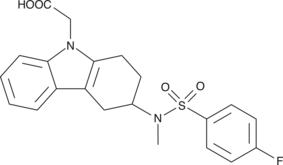
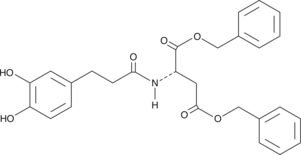


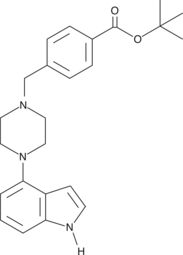
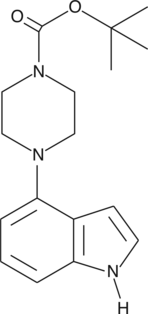
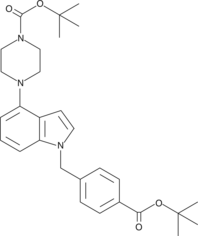
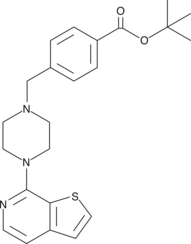
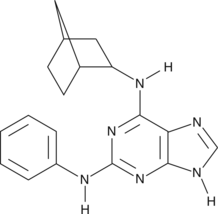
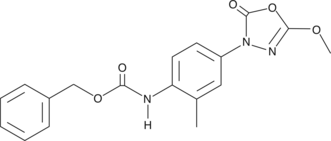

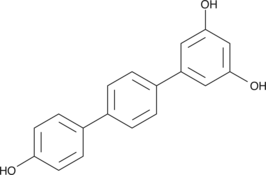


![A potent and selective CB1 receptor inverse agonist (Ki = 243 nM; EC50 = 195 nM); a 10 µM concentration results in 100% and 35% displacement of [3H]-CP-55](https://interpriseusa.com/wp-content/uploads/2021/06/10008669.png)





